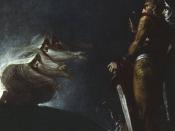Since the beginning of time, people have pondered the existence of evil. What makes people laugh at other peoples' mistakes? What makes a little kid relentlessly pick on the outcast? What fuels the hate that people have for each other? Everyone has their individual views and answers to these questions, and their own definition of evil. Evil is an entity inside every living being in the world characterized by selfishness, torturing, and ultimately, the unjustifiable taking of others' lives.
For many, selfishness is the beginning of evil. Macbeth is the perfect example of this. Macbeth, one of king Duncan's most popular warriors, killed Duncan because the witches told him that he will be king, but they did not say how he will become king. For all he knew, Duncan would have choked on his breakfast and died, but he didn't take that chance. Macbeth's selfishness was opitimized when he dealt with Banquo and his son, whom the witches said will be king after Macbeth.
He had Banquo murdered, and his son's 'absence is no less material' (Shakespeare III.1) to Macbeth. Of course Macbeth wasn't the only one who began his reign of evil with selfishness. Jack, in Lord of the Flies also begins tearing the island apart when he becomes extremely selfish. 'I'm not going to play any longer...not with you' (Golding 127) is what he said to the group, right before he broke away and formed his own clan, where he was the unchecked ruler, and could perform any task he pleased. One of Jack's other intolerable acts was the tying up and torturing of Wilfred, another boy on the island.
Torturing others is the next step in the quest to become evil. 'He didn't say what for' was the other boys' answers for why Jack tied up...


